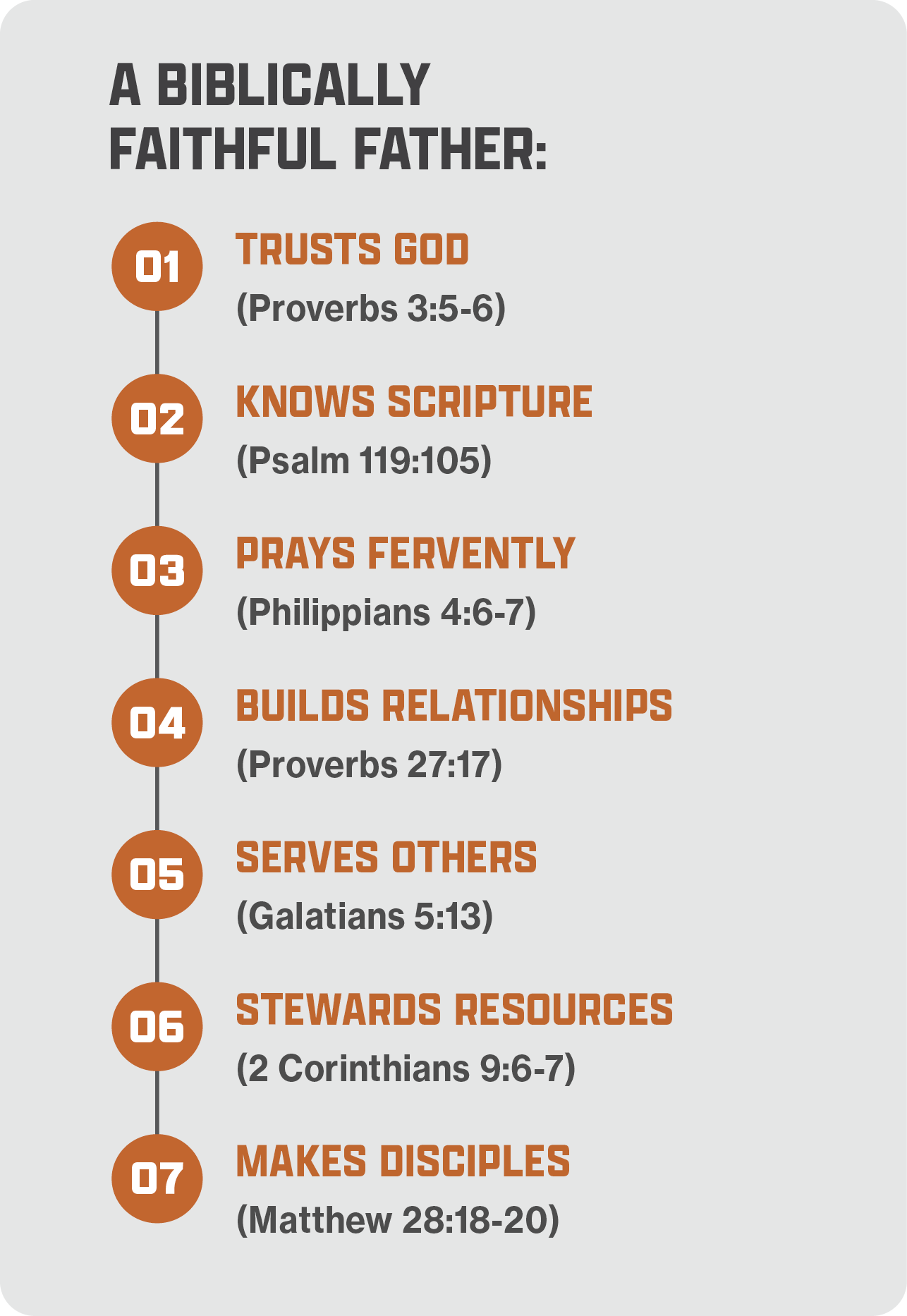I was not raised in a Christian home. I never had a model for what it means to follow Jesus—certainly not as a father. It wasn’t until after I was saved at the age of 18 and got involved in a local church that I saw something that would shape my life: a man faithfully leading his family in Christ. His consistency, gentleness, and conviction left a mark on me. That image stayed with me and has profoundly influenced how I love, lead, and serve my own family today.
Unfortunately, that experience is not common.
Many fathers today have never seen spiritual leadership modeled in the home. They want to disciple their children, but they’re unsure how. Some are still learning how to walk with Christ themselves. The State of Biblical Fatherhood Report confirms what so many pastors already know: countless men feel unequipped, unsupported, and discouraged. The report notes that many fathers are struggling to lead well and be intentional, often feeling like they’re failing at many things, especially spiritually.
And yet, embedded in that struggle is a powerful opportunity. The local church can become a place of re-formation—where fathers are not sidelined, but strengthened; not condemned, but called up.
I. Why the Church Must Invest in Fathers
Scripture is clear about a father’s spiritual role. “Fathers, do not provoke your children to anger,” Paul writes, “but bring them up in the discipline and instruction of the Lord” (Eph. 6:4). This charge is not merely parental—it’s pastoral. A father is meant to shepherd his children toward Christ.
But too often, that vision is clouded by cultural confusion, spiritual insecurity, or personal history. The State of Biblical Fatherhood reveals that many dads were never discipled themselves. They’ve never had someone teach them to read Scripture, pray with their kids, or initiate spiritual conversations in everyday life. They feel the weight of responsibility—but are unsure how to carry it.
This is where the church must step in—not to replace the role of the father, but to reinforce it. When the church comes alongside fathers with clarity, encouragement, and grace, families are strengthened, and generations are changed.
II. Engage, Equip, Empower: A Strategy for Church-Based Fatherhood Ministry
This framework gives churches a way forward. It doesn’t require a complete overhaul of programming. It requires a renewed commitment to discipling men where it matters most: in their homes.
Engage Fathers Relationally and Redemptively
Many men walk into church each Sunday wearing invisible weight—shame from past failures, fear of not measuring up, and uncertainty about where they fit. If we want to disciple fathers, we have to begin with invitation, not expectation.
That means engaging them personally. Like Jesus with His disciples, our starting point is presence, not performance. Pastors and ministry leaders must create space for men to speak openly, ask questions, and admit what they don’t know—without fear of being dismissed or judged.
Ways to Engage Fathers Well:
- Host informal breakfasts, barbecues, or gatherings that foster honest conversation.
- Encourage older, godly men to initiate mentoring relationships with younger dads.
- Use preaching and testimonies to normalize spiritual struggle and highlight ongoing growth.
- Train leaders to see the men in their churches as disciple-makers in process, not projects to be fixed.
The parable of the prodigal son doesn’t begin with a lecture—it begins with a father running to embrace his son. Our churches should reflect that posture.
Equip Fathers with Biblical Vision and Practical Tools
Once the heart is engaged, the hands must be trained.
Too many fathers have never been shown how to lead spiritually at home. It’s not that they’re unwilling—it’s that they’re underprepared. The church can help by giving them a clear vision for spiritual fatherhood and the practical tools to walk it out.

As Paul writes to Timothy, “Train yourself for godliness” (1 Tim. 4:7). That kind of training isn’t abstract. It’s rooted in discipline, Scripture, community, and the Spirit’s power.
Ways to Equip Fathers:
- Offer short, focused workshops on prayer, leading devotions, or shepherding the heart of a child.
- Provide easy-to-use tools: family prayer cards, short devotionals, bedtime blessing guides.
- Integrate fatherhood-focused content into men’s ministry, small groups, and Sunday classes.
- Regularly include applications for fathers in your sermons—not just on Father’s Day.
Equipping fathers isn’t about overwhelming them with theology. It’s about anchoring them in grace and giving them simple next steps to follow.
Empower Fathers with Gospel Identity and Spirit-Led Authority
Engagement builds trust. Equipping builds confidence. Empowerment ignites purpose.
To empower fathers is to remind them of who they are in Christ and what they’ve been called to do. Every believing father has been filled with the same Spirit that raised Jesus from the dead. He has access to the Word, the body of Christ, and the living presence of God. What he often lacks is affirmation and vision.
Churches must speak into that void.
Ways to Empower Fathers:
- Publicly affirm and commission dads during worship services—reminding them of their calling.
- Invite fathers into visible leadership roles in ministries focused on family and discipleship.
- Create circles of accountability, prayer, and encouragement among dads in every stage of life.
- Help them see that they are not second-string spiritual leaders—they are the first pastors their children will ever know.
Empowered fathers lead differently. They serve sacrificially, love intentionally, and disciple faithfully—not because they’re perfect, but because they’ve been entrusted with a holy calling.
III. A Call to the Church
If we want to see revival in our churches, we must start in our homes. And if we want our homes to be places of formation, our fathers must be men of faith, conviction, and courage.
That doesn’t happen by accident. It happens when churches intentionally disciple the men who disciple their families.
This is not just a strategy—it’s a stewardship. God has entrusted His church with an opportunity to invest in fathers not for popularity or programmatic growth, but for the glory of His name and the good of His people.
Let’s not miss it.












